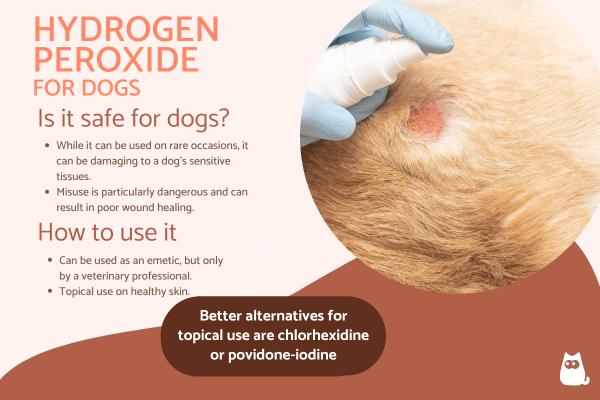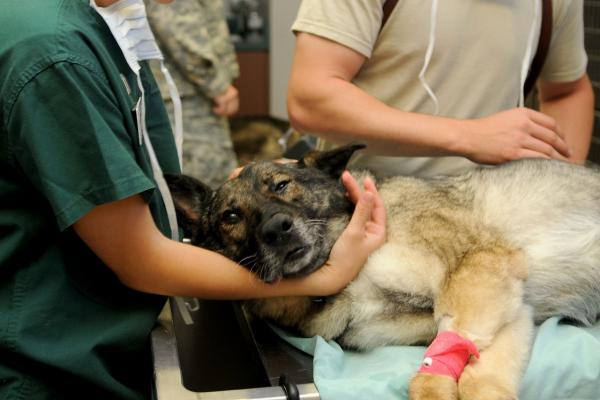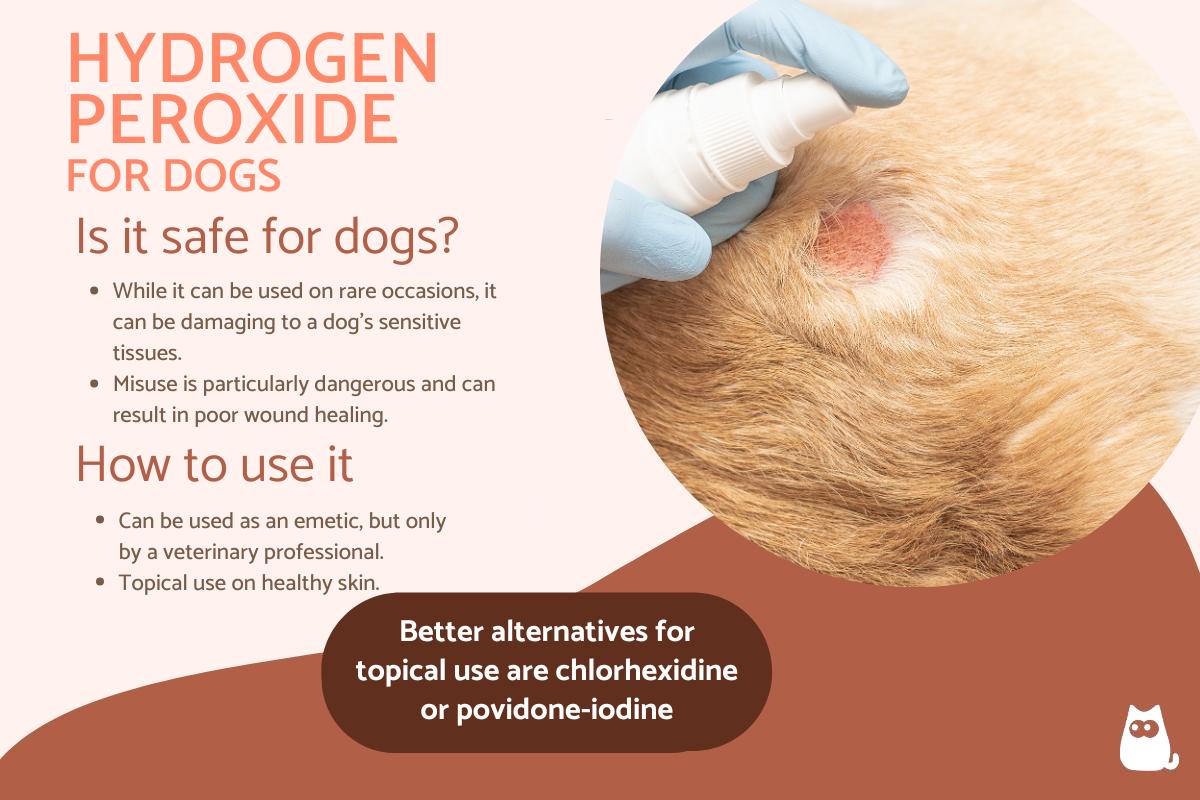Is Hydrogen Peroxide Safe for Dogs?



See files for Dogs
Hydrogen peroxide is a widely used antiseptic that is commonly administered to treat minor injuries or other health problems in humans. It is often used topically, but can be used to treat ear infections and other ailments. Generally speaking, a dog's skin is more sensitive than our own. Even in diluted form, hydrogen peroxide can be very irritating to a dog. It can also be dangerous to use around very sensitive tissues such as those found in the ear canal. However, this doesn't mean hydrogen peroxide can never be used to administer to dogs.
At AnimalWised, we ask is hydrogen peroxide safe for dogs? We discover in which cases hydrogen peroxide can be used, when it should be avoided and what dangers it poses for the health of the animal.
Is hydrogen peroxide safe for dogs?
Some chemical compounds are toxic to dogs because they have a particular sensitivity to them. For example, dogs should not eat onions because they contain disulfides and thiosulphates which are toxic to the canine digestive system, but which humans can tolerate well. Hydrogen peroxide is a chemical compound which will be toxic to any animal due to its corrosive properties, but humans are better able to tolerate it better than dogs.
Due to their increased sensitivity, hydrogen peroxide is generally not safe for dogs. The reasons for their sensitivity are the following:
- Thinner skin: dogs have an epidermis which is around 2/3 thinner than that of humans. While the outermost layer of a human's skin is around 10-15 cells thick, a dog's epidermis is only around 3-5 cells thick.
- Follicle density: as you may be able to guess, a dog has more hair follicles on their skin than humans. Since they cause the skin to be more sensitive, the greater distribution of follicles means dogs are more susceptible to irritation by chemicals such as hydrogen peroxide.
- Higher skin pH: the pH of a human's skin is more acidic than that of dogs, the latter registering as more neutral. This acidity acts as a protective layer against certain compounds, known as an acid mantle. Dogs are more vulnerable to hydrogen peroxide because they lack this protective layer.
- Fewer sebaceous glands: sebaceous glands produce protective oils which also act as a skin barrier. Since dogs have a less even distribution of these glands, they have a reduce protection.
Other factors such as sensitivity to allergens and temperature can also increase the risk of skin damage when hydrogen peroxide is used topically.
Despite this increased sensitivity, a dog may not necessarily have a reaction to hydrogen peroxide. This will largely depend on the concentration. When sold in its commercial form for topical use in humans, it is diluted to a maximum concentration of 6% when used topically. It is also often sold in a 3% solution.
Especially in lower concentrations, it is unlikely a dog will receive serious skin damage when hydrogen peroxide is used topically. However, this will depend on certain factors, including the sensitivity of the individual dog. It is highly recommended that we do not use it on a dog's ears since these areas are highly sensitive and misuse can cause serious damage.
Although it can be used as an oral wash in humans, it is contraindicated for ingestion. Conversely, it may be used internally in certain circumstances in dogs. We explain how this may be in the next section.
Uses of hydrogen peroxide for dogs
Despite the increased sensitivity of a dog's skin, many guardians still wonder if hydrogen peroxide is safe for dogs. The answer to this query is dependent on this use. For this reason we look at different potential uses in detail to determine hydrogen peroxide safety in dogs:
- Topical antiseptic: the most common use of hydrogen peroxide in humans is as a topical antiseptic agent. It can be used to disinfect skin or wounds to help prevent the proliferation of microorganisms such as bacteria. While hydrogen peroxide may have some benefit, it is not ideal and it also poses a risk of damage to exposed tissues. This can slow the healing process.
- Ear cleaner: while it can happen in some dogs more than others, all dogs are susceptible to otitis. This an inflammation of the ear, often as the result of infection. The tissues around the ears and the ear canal itself are particularly sensitive. Using hydrogen peroxide to clean ear infections can be very risky, especially if it were to enter the ear canal. In general, hydrogen peroxide to treat ear infections in dogs should be avoided.
- Emetic: an emetic is a drug or compound which is used to induce vomiting. Hydrogen peroxide can be used in this capacity, but only under clinical supervision by a qualified veterinarian. The use of this compound as an emetic is to induce vomiting when a dog has ingested something toxic. Whether it will be useful to your dog will need to be determined by a professional and it should only be used in emergency situations. Using an incorrect dosage or in an inappropriate manner can cause more harm than good, so it is not something we should use for home treatments.
- Mouth cleaning: humans often use a weak solution of hydrogen peroxide as an oral wash, but this cannot be applied to dogs. They will be unable to swirl the liquid in their mouth and there is a greater risk of them swallowing it. While it may have some antimicrobial benefit, it should be avoided as a replacement for toothpaste due to the potential of irritation to the oral mucosa.
With the above in mind, we should avoid the use of hydrogen peroxide in dogs. While it may have some efficacy, it poses a risk to the sensitive tissues of a dog. There are also many better options available which are recommended by veterinarians. These are antiseptics which are designed specifically for use in canines. Emetic use should only be carried out by a veterinarian or under their express instruction.

Side effects of hydrogen peroxide in dogs
As we have explained, the use of hydrogen peroxide in dogs is not recommended due to issues with efficacy and safety. The main safety risk is tissue damage. If your dog has a wound or other lesion, we want to use antibacterial agents to promote healing and to avoid secondary infections. Hydrogen peroxide is considered aggressive due to its oxidizing effect, generating free radicals which attack the membranes of skin cells.
The action of hydrogen peroxide can result in superficial irritation of the skin, especially areas with lesions such as wounds. This can help promote the healing of such lesions, but it can also result in excessive irritation. When this happens, it can result in the following side effects:
- Abrasion
- Pain
- Inflammation
- Localized capillary thrombosis
- Delay in the formation of fibroblasts
The issue with fibroblast formation can result in poor wound healing. This side effect is especially important if hydrogen peroxide is used on delicate areas with sensitive skin, such as the earlobes or mucous membranes. This irritation can be painful for the animal. In these cases, it is best to use disinfectant products that have been specifically formulated to treat injuries in dogs.
If hydrogen peroxide is used as an emetic, the risk increases when carried out incorrectly. In these cases, the abrasion will affect very sensitive internal tissues in the digestive tract. It can result in the following side effects:
- Abdominal pain
- Diarrhea
- Apathy
- Lack of appetite
If we administer hydrogen peroxide to our dog and we observe negative side effects, you should seek veterinary advice. It is possible they are in danger and will need treatment to mitigate the damage.
Alternatives to hydrogen peroxide in dogs
Since the efficacy and safety of hydrogen peroxide for dogs means its use should be minimized, we need to look at alternatives for wound healing and other treatments. Such alternatives to hydrogen peroxide include:
- Chlorhexidine: this is an effective agent which has antimicrobial properties, but which is generally considered very safe for use in dogs. It does not usually cause irritation and is used in surgical interventions by professionals.
- Povidone-iodine: another antimicrobial agent which is effective against bacteria, viruses and fungi. Often sold under the brand name of Betadine for dogs, it is has minimal side effects.
There are other antimicrobial agents which can be used. If we cannot use either of the above, speak to your veterinarian for advice. Some home remedies might provide some relief, but their use can also complicate the clinical picture. Speak to your veterinarian if you wish to use them.
Learn more about treating dog wounds at home with our related guide.

Contraindications of hydrogen peroxide for dogs
Although hydrogen peroxide can be used topically in some dogs, its use is not recommended. However, there are some dogs which have specific contraindications which mean its use should be avoided completely. For this reason, we explain what you need to consider if you do use hydrogen peroxide on your dog:
- Do not use hydrogen peroxide directly on deep or perforating wounds. In addition to being painful, it can affect the muscle and other internal structures. Hydrogen peroxide is ideally used as an antiseptic for healthy skin, i.e. skin without open wounds or similar lesions.
- Avoid use in very sensitive areas such as the ears, oral and anal mucous membranes, as well as the nose or periocular area.
- Use diluted hydrogen peroxide in small amounts and only occasionally, avoiding prolonged use on injuries.
- If your dog has ingested something dangerous, always consult with your veterinarian about the need to induce vomiting and don't use hydrogen peroxide without express instruction from a professional. Learn about why a dog vomits black liquid in our related article.
- Observe your dog after applying hydrogen peroxide. If the area becomes very irritated, swollen or the animal complains, it may have suffered an allergic reaction to the antiseptic.
- Use gloves and gauze to apply hydrogen peroxide to maintain proper asepsis.
This article is purely informative. AnimalWised does not have the authority to prescribe any veterinary treatment or create a diagnosis. We invite you to take your pet to the veterinarian if they are suffering from any condition or pain.
If you want to read similar articles to Is Hydrogen Peroxide Safe for Dogs?, we recommend you visit our Medicine category.







